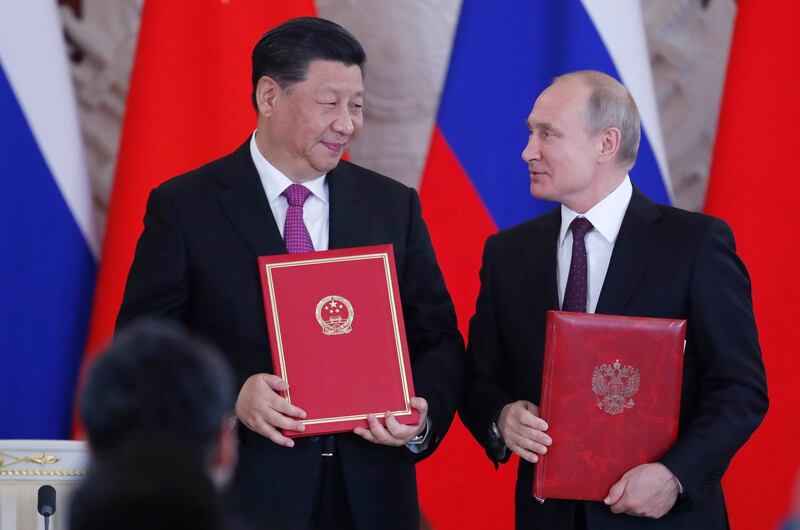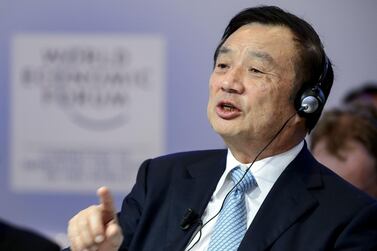Russian President Vladimir Putin praised the “new era” in his country’s relationship with China as President Xi Jinping arrived for an ambitious visit, but Moscow will likely maintain its red lines when it comes to doing business with Beijing.
Ahead of a tour by the Chinese leader, which is expected to bring a flurry of fresh trade deals and signal to the West that Russia is deepening its economic ties with Asia, Mr Putin on Wednesday said that relations between the two nations have reached "unprecedentedly high levels.”
His optimism was no less matched by Mr Xi on his arrival in the Russian capital on Wednesday afternoon. "I am certain that this visit will certainly yield fruitful results and serve as an incentive to the steady development of Chinese-Russian relations of comprehensive partnership and strategic interaction in the new era."
The Chinese president’s comments fire the starting pistol on a three-day visit to Russia that melds economic integration with cultural collaboration – Mr Xi will open a panda pavilion at Moscow’s zoo and a visit to the capital’s lavish Bolshoi Theatre.
The two countries are marking the 70th anniversary of diplomatic relations this year and their leaders are expected to sign a raft of treaties during bilateral talks.
Russia’s economic and diplomatic ties with China have deepened since 2014, when Western countries imposed targeted economic sanctions on Moscow for its annexation of the Crimean peninsula.
The economic penalties, which the West has redoubled, forced the Kremlin to seek out new partners to fill the shortfall in foreign money coming from Europe and the United States.
The Chinese president’s visit comes as both he and the Russia leader have come under the rhetorical crosshairs of United States President Donald Trump.
The US leader and Mr Xi are locked in a trade conflict, while America is threatening further sanctions on a new gas pipeline connecting Russia and Western Europe.
In a show of those deepening ties, Mr Xi will be the guest of honour tomorrow on the opening day of the St Petersburg International Economic Forum, Russia’s flagship economic conference. The congregation of foreign leaders and investors is attended by high-ranking Kremlin officials including Mr Putin.
The Chinese president is by far the most high-profile leader to attend the Russian president’s plenary session, which will include the heads of Bulgaria, Slovakia and Armenia, a rooster from which Western leaders are notably absent.
The conference this year has been overshadowed by the arrest of Michael Calvey, the American founder of the private equity firm Baring Vostok on embezzlement charges. His arrest in February has shocked the business community and has been met with strong criticism from CEOs of European businesses in Russia.
Mr Putin has placed his hope in a strong showing from Mr Xi and his 1000 strong Chinese delegation at the St Petersburg forum to send positive signals over the Russian economy. It will be a sizeable task given that net foreign direct investment fell in Russia fell to $6 billion in 2018 from $26 billion in 2017.
However, Alexander Gabuev, senior fellow and chair of the Russia in the Asia-Pacific Program at the Carnegie Moscow Centre think tank, says that despite the high praise, there are clear limits to Moscow’s enthusiasm for working with Beijing.
“Russia certainly does not want to offer its resources and territory for China-led projects that would make Moscow more dependent on Beijing,” he said during a roundtable on China’s Belt and Road initiative, a massive trade and infrastructure project to boost global trade networks.
Moscow, he said, “is particularly careful not to incur too much Chinese debt. Moscow does not want Beijing to own any projects: they must be joint ventures, over which Russia exercises ultimate control.”
Chinese labourers will also be an issue for Russia, he says. “The Russian government wants infrastructure projects to stimulate employment but also wants to avoid interethnic tensions.”






